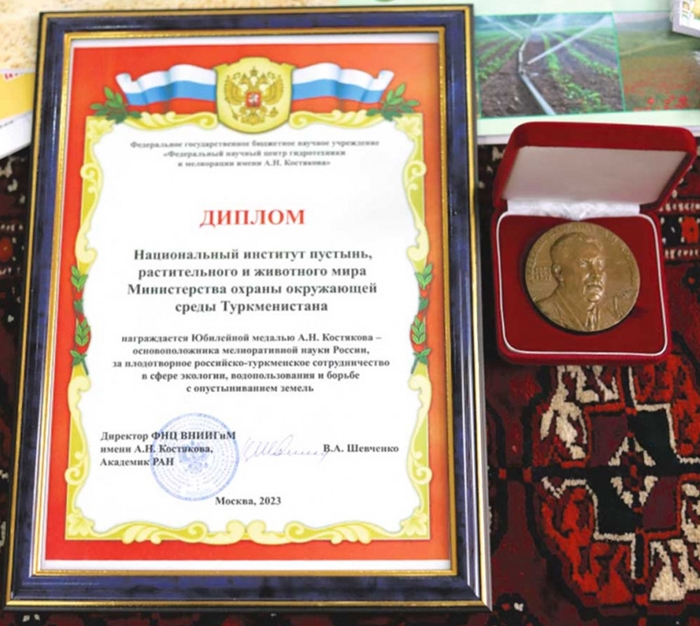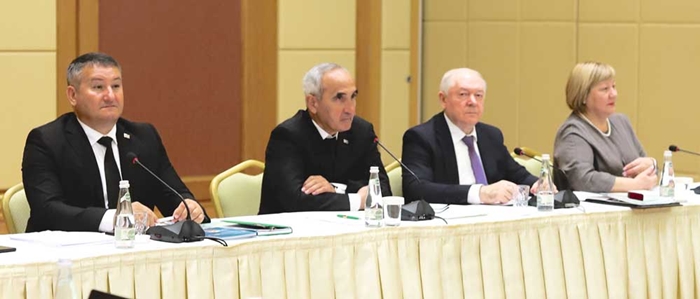 The National Institute of Deserts, Flora and Fauna of Turkmenistan was awarded the commemorative medal of A.N.Kostyakov, the founder of the reclamation science of Russia, for fruitful Russian-Turkmen cooperation in the field of ecology, water use and combating desertification of lands, the newspaper “Neutral Turkmenistan” reports.
The National Institute of Deserts, Flora and Fauna of Turkmenistan was awarded the commemorative medal of A.N.Kostyakov, the founder of the reclamation science of Russia, for fruitful Russian-Turkmen cooperation in the field of ecology, water use and combating desertification of lands, the newspaper “Neutral Turkmenistan” reports.
The diploma and medal were handed over to the director of the Institute, PhD in Biological Sciences Pirli Kepbanov during a round table with the participation of Russian and Turkmen desert scientists.
The event entitled “Approaches to solving issues of desertification and land degradation: the experience of the National Institute of Deserts, Flora and Fauna and the All-Russian Research Institute of Hydraulic Engineering and Land Reclamation named after Kostyakov” brought together the heads of structural scientific institutes and production units of ministries and departments of Turkmenistan – environmental protection, agriculture and water resources, scientists of the Academy of Sciences of Turkmenistan, Turkmen and Russian experts in the field of land use, land reclamation, hydraulic engineering, GIS technologies, forestry, protection of biodiversity.
Tackling Desertification: Turkmenistan’s Proactive Approach
In a round-table discussion, Amanklych Babayev, a renowned expert in Turkmen desert science and a corresponding member of the Academy of Natural Sciences, highlighted Turkmenistan’s proactive efforts to combat desertification. He emphasized that the National Institute of Deserts, Flora, and Fauna has developed comprehensive theoretical and practical guidelines, including the National Action Program to Combat Desertification, which outlines measures being taken to restore degraded lands and reverse desertification processes.
Mass forestation campaigns have emerged as a key strategy in this fight against desertification.
Babayev drew attention to the unique challenges posed by the Karakums desert, where over time, desolate, vegetation-deprived soils form around the desert’s 6,000 wells. These barren expanses, visible even from space, pose a significant environmental threat. Scientists are actively exploring innovative solutions to reclaim these areas and restore their ecological balance.
Gurbanyaz Hommatov, head of the research department of the design institute “Turkmensuwylymtaslama” (Turkmen Water Project), discussed the positive impact of collector and drainage water networks within the Turkmen lake “Altyn asyr” channel system. He explained that evaporation and irrigation from these networks have a beneficial effect on wildlife, promoting the growth of vegetation and enhancing the overall ecosystem.
However, Hommatov also acknowledged the challenges posed by climate aridization, which has changed the conditions for the survival of desert plants both in nature and in afforestation areas, where trees are planted to protect against saline and dusty winds originating from the dried-up Aral Sea bed.
Turkmenistan updates the National Action Program to Combat Desertification
PhD in biological sciences Mukhammet Durikov, Director of the Scientific Information Center of the Interstate Commission for Sustainable Development of the International Fund for Saving the Aral Sea, presented the updated National Action Program to Combat Desertification (NAP) in Turkmenistan, which was adopted in 1997.
The revised NAP outlines a comprehensive set of measures to address desertification in the country, encompassing sustainable land management practices, preventing the degradation of natural pastures and irrigated lands, reforestation initiatives in the context of climate change, and harmonization with relevant international programs.
FAO/GEF Regional Project in Turkmenistan
Rahman Khanekov, the head of the FAO/GEF regional project “Integrated management of natural resources in drought-prone and saline agricultural production landscapes of Central Asia and Türkiye” in Turkmenistan, highlighted the project’s ongoing implementation across three agroecological regions in the country. As part of the project’s initiatives, eight nurseries have been established to cultivate drought-resistant and salt-tolerant plant species.
Additionally, resource-saving technologies are being introduced in livestock farms, including the construction of wells and sardobas, traditional reservoirs for storing drinking water. Ten such structures have already been built, and many more are planned.
Furthermore, fifteen greenhouses are being established to fulfill the objectives of the National Forest Program of Turkmenistan, contributing to reforestation efforts and enhancing biodiversity.
The FAO/GEF project also provides material and technical assistance to partners, including the procurement of mini-tractors and laser planners. Additionally, kits for laboratory research are being provided to support soil and water analysis. To further enhance the capacity of project participants, trainings are being conducted. ///nCa, 14 November 2023 [photo credit – Neutral Turkmenistan newspaper]
#Turkmenistan, #Russia, #desertification, #land_degradation,
